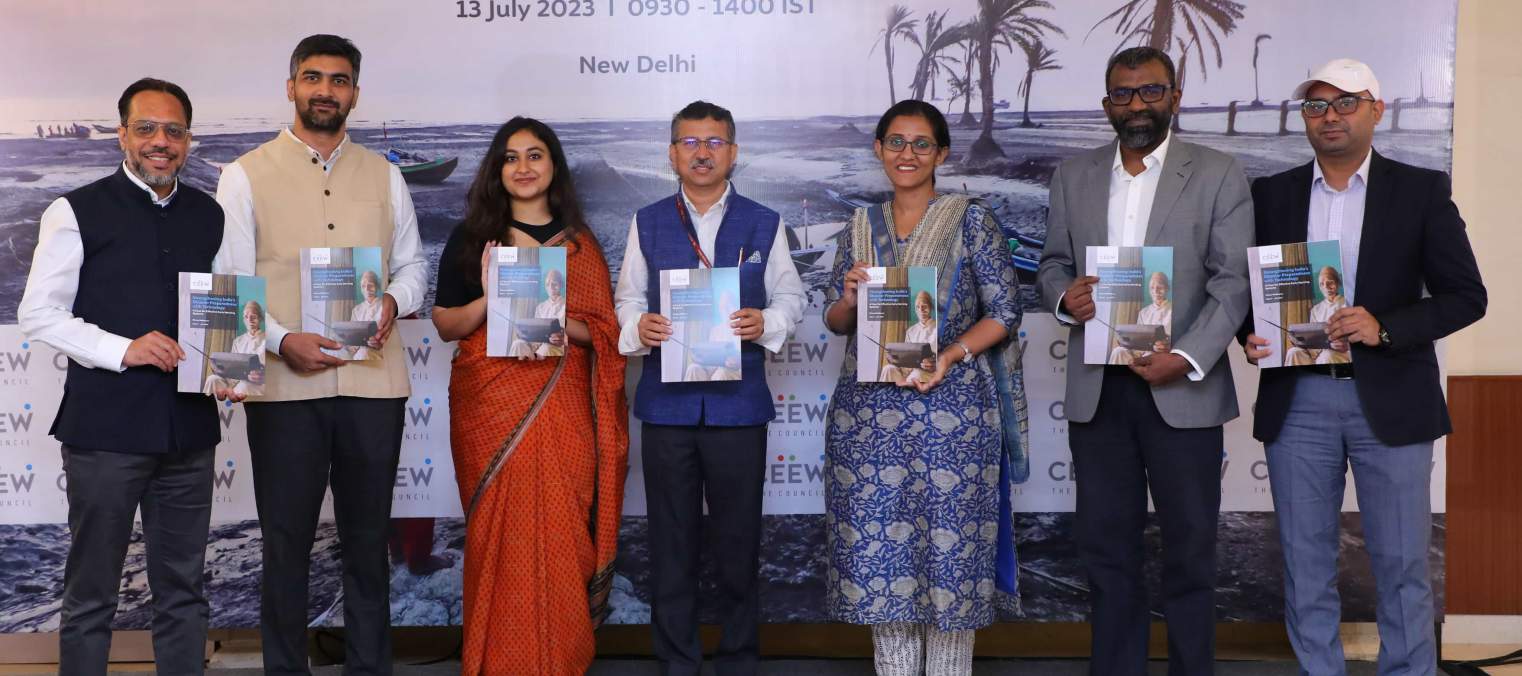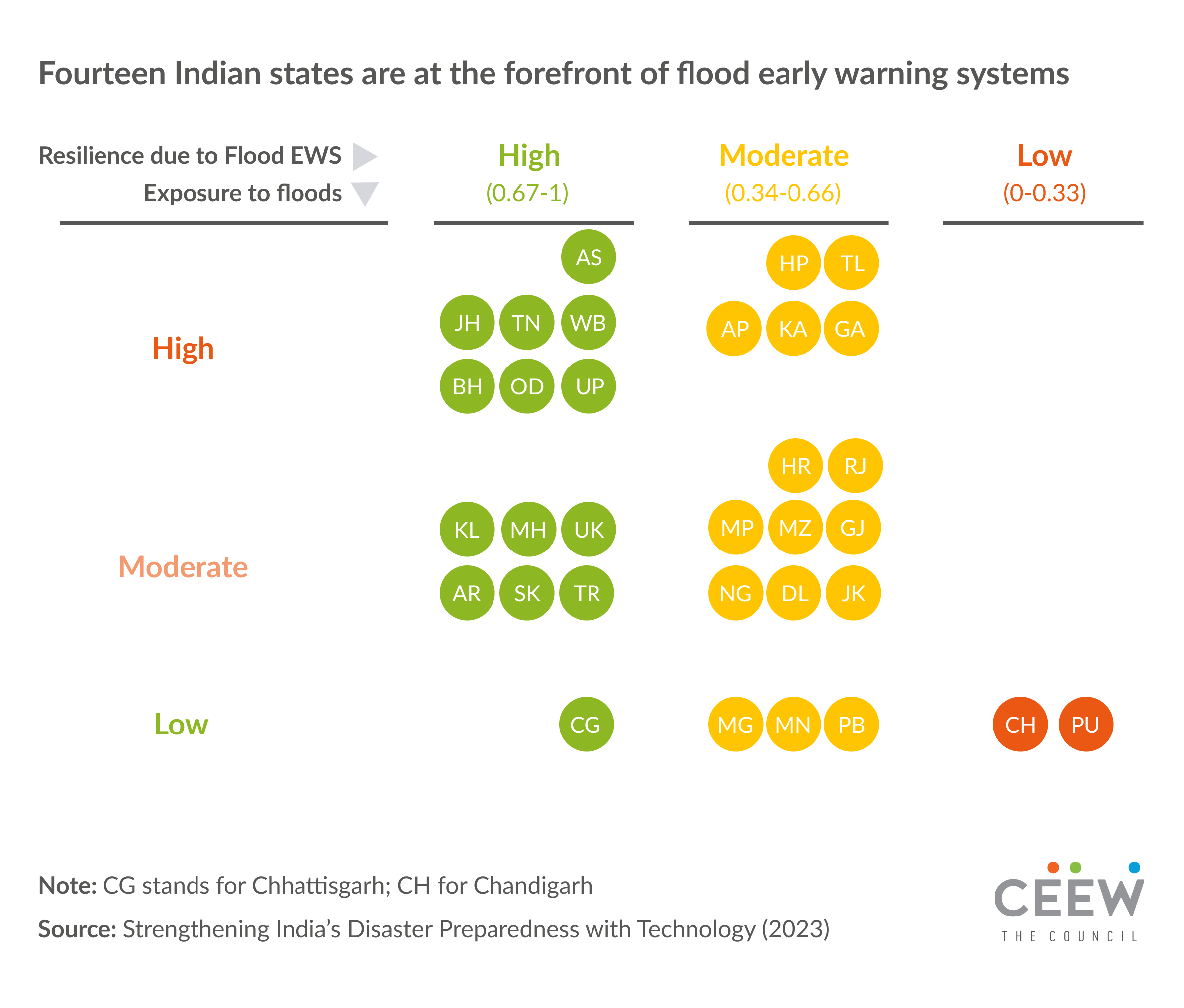




New Delhi, 13 July 2023: Fourteen Indian states have better resilience to floods due to the availability, accessibility and effectiveness of early warning systems, according to a new report released by the Council on Energy, Environment and Water (CEEW) today. States such as Assam, Odisha, Sikkim, Uttar Pradesh, Uttarakhand, Jharkhand, and Kerala lead the way. The report, ‘Strengthening India's Disaster Preparedness with Technology: A Case for Effective Early Warning Systems’, highlights that early warning systems are a critical component of building climate resilience as the country sees increasing extreme weather events such as floods and cyclones in recent times. These early warnings are also a part of disaster risk reduction, a key focus area under India’s G20 Presidency.
The CEEW study calculated resilience to floods and cyclones as a sum of availability (presence of early warning stations), accessibility (share of people who have access to information, say, through phones) and effectiveness (presence of governance and financial frameworks) of early warning systems. CEEW’s analysis revealed that with accelerating climate change, states need to rapidly expand the availability of flood early warning systems. While 72 per cent of Indian districts are exposed to extreme flood events, merely 25 per cent of these exposed districts have level flood forecasting stations. Further, while 24 states in India have institutional mechanisms in place for flood early warning systems, only 6 – Jharkhand, Tamil Nadu, Assam, Kerala, Himachal Pradesh, and Goa – show moderate utilisation of the funds dedicated to it.
Dr Vishwas Chitale, Senior Programme Lead, CEEW, said, “The recent floods in India and Cyclone Biparjoy have once again shown the importance of investing in early warning systems. India is rapidly expanding its early warning coverage by embracing transformative technologies. However, as we witness swapping patterns in the climatic extremes in the country, where previously drought-prone areas are now facing floods, all states need to ramp up their early warning systems to safeguard lives and livelihoods. States should leverage state-of-the-art technologies to build inclusive, impact-based multi-hazard early warning systems that involve the local communities for last-mile connectivity. Intensifying adaptation finance for enhancing disaster preparedness is the need of the hour.”
The CEEW report further notes that India has demonstrated leadership in cyclone early warning systems. Cyclone warnings are available to 100 per cent of the exposed population in the country. Coastal states such as Andhra Pradesh, Odisha, Goa, Karnataka, Kerala, and West Bengal are at the forefront of building resilience by establishing effective cyclone early warning systems. As cyclones increase in frequency with warming oceans, inland states in the path of these cyclonic storms will also need to strengthen resilience.
Shreya Wadhawan, Programme Associate, CEEW, said, “Early warning systems are a low-hanging fruit in disaster preparedness. The central and state governments should also invest in regional real-time flood monitoring microsensors, and collaborate with the private sector to improve these warning systems. Leveraging its position as the G20 presidency, India should promote the agenda of making early warnings available to all and champion impact-based people-centric systems for disaster risk reduction.”
A 2021 study by CEEW found that 27 Indian states and union territories (UTs) are vulnerable to extreme hydro-met disasters and their compounded impacts. The country suffered damages worth USD 7.6 billion (INR 62,000 crore) due to extreme flood and cyclone events in 2021 alone (WMO 2022). Currently, India’s cyclone early warning systems are much more robust than its flood ones, but as each state faces an increase in the frequency and intensity of climatic extremes, it is important to build effective early warning systems for all.
Read the full report ‘Strengthening India's Disaster Preparedness with Technology: A Case for Effective Early Warning Systems’ here.

For media queries contact Tulshe Agnihotri – [email protected] | +91 9621119643